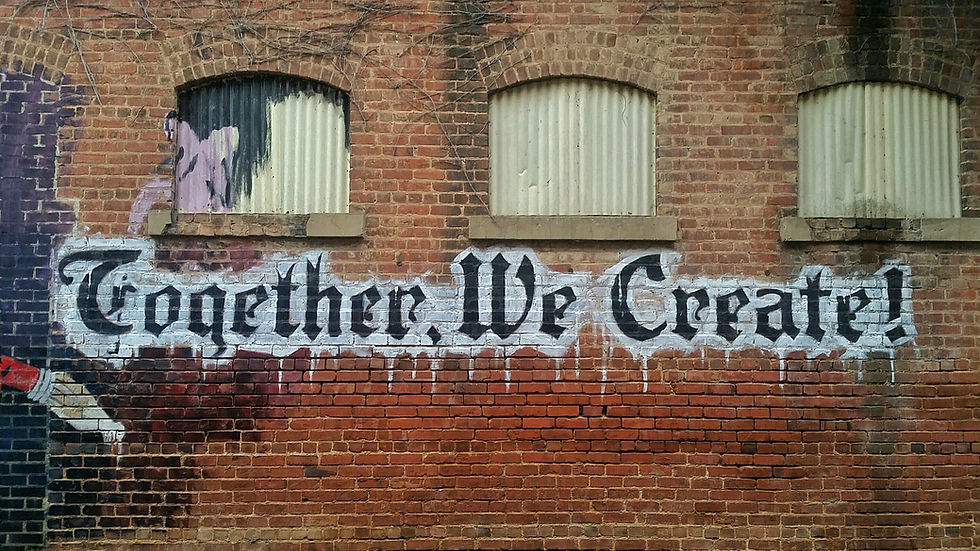Let's Change the World!
- Rebecca Burnham
- Feb 20, 2025
- 6 min read
Updated: Apr 21, 2025

I have a dream. Not a distant, head-in-the-clouds, genie-in-a-lamp kind of dream. A concrete, actionable, run-as-fast-as-you-can-to-get-there dream. And I believe in it, partly because of the spirit-soaring power with which it entered my heart. And partly because of our world’s crying need for it to be brought to pass.
The Dream
It is this: in 2034, when people from all over the globe gather to Salt Lake City for the Winter Olympics, that city will be flooded with living proof of musical theatre’s power to build the Beloved Community. Everywhere theatre-goers look, they’ll be greeted by world-class musicals that were written with an eye to igniting our highest aspirations and replacing alienation with understanding. They will do the latter better than any musicals have done before because they will be written with passion, honesty and nuance by collaborative teams who are telling shared stories together rather than competing for dominance. What’s more, these shows will be produced by seasoned directors who are just as skilled at building resilience, capacity and belonging among cast and crew as they are at crafting an unforgettable production. For many, from audience and cast members to production teams, the experience will be life-changing. It will revolutionize both the way they see theatre and the way they approach differences with their neighbours. And that will just be the beginning.
The musicals of 2034 Salt Lake City will ignite a movement that echoes across the globe, from Atlanta to Zurich. Schools, community builders and peacemakers worldwide will start staging together mighty, shared stories, in order to bridge perplexing divides and restore resilience to shattered communities and down-trodden individuals.
Salt Lake City will arise as the cradle of this movement. Its theatres will become as renowned as Broadway’s and the West End’s, but not in the same way. Where those epicenters of the stage tend to be driven by commercial interests and to promote the narratives that are currently in vogue, the Salt Lake brand will be mission-focused. It will be built with intention, from the ground up, in pursuit of the Beloved Community. It won’t just be the lifting and uniting themes of the shows that define that. It will also be the collaborative spirit in their creation and production, the honouring of everyone’s needs, the replacing of diva, dog-eat-dog and run-yourself-ragged-while-you-hussle-for-a-role mentalities, with mentorship, genuine care, and fair compensation.
Crazy pipe dream?
No.
Here’s why:
Basic business fundamentals say that when you want to launch a new initiative, you look for a need that you are uniquely positioned to fulfill. Let’s look first at the need, and then at Salt Lake City’s unique positioning to fulfill it.
The Need
I already wrote at length about the need for musical theatre that lifts and unites, so I’m going to contain myself to a brief summary. Our world faces twin crises of hope and social cohesion. A mountain of statistics indicate that people are increasingly discouraged and isolated while communities are becoming ever-more polarized. There’s a growing tendency to retreat into safe associations with people who look and think like us, and to assume that the people who think differently are out to take away our rights, to trample on what we treasure, to remake society in an image we abhor. The crisis of hope drives a self-perpetuating cycle of addiction, abuse and familial breakdown. The crisis of social cohesion drives civil unrest, government by decree and armed conflict. It prevents us from getting a rounded perspective on the problems we face and threatens our very ability to self-govern. This danger is sufficiently well recognized that a variety of organizations are cropping up to combat polarization and help us hear each other across our divides. Among my favourites are Braver Angels and Tangle News.
How can musicals help? They treat the crisis of hope with therapeutic play. Participating in them builds strong interpersonal connections and personal resilience. This is especially the case if the messages are empowering and uplifting.
In order to build social cohesion, we also need musicals that do even more. They need to tell stories that ring true across our differences, that give us light-bulb moments when we suddenly understand where our ideological opponents are coming from. That doesn’t happen accidentally. It takes intentional effort, courage, and working across divides to tell such stories authentically and effectively. I’m talking about things like a collaboration between a Muslim and a Catholic to write a musical about the unlikely friendship between Francis of Assisi and Sultan Al-Kamil of Egypt, that helped end the crusades. Or a musical about African American jazz musician Daryl Davis befriending Imperial Wizard of the KKK Roger Kelly and eventually persuading him to leave the Klan. Or Democratic presidential hopeful Shirley Chisholm (an African American congresswoman from Brooklyn) visiting hospitalized rival George Wallace (the segregationist governor of Alabama) after an assassination attempt had paralyzed him, and how this sparked a complete change in his views and his treatment of blacks. Standard treatment of the white supremacists in those stories would be to make them unsympathetic villains until their change of heart. But wouldn’t it be more powerful to humanize them – show them as blinded but still lovable, like Daryl Davis sees them – even while they are clinging to supremacist views? If that’s uncomfortable, it shows how far we are from a culture that can call people in instead of out. Imagine a collaboration between at least two southerners, one black with roots in the civil rights movement and the other white with progenitors who opposed it, to tell such stories with richness, depth, and approachability.
Are such collaborations even possible? Unquestionably, yes. Braver Angels has, for the last two-and-a-half years, been hosting songwriting co-writes across political divides in order to help heal communities. The results have been beautiful. Applying the same principles to writing musicals is not much of a stretch.
The Unique Positioning
So, the need is real, But why Salt Lake City? How is Utah’s capital city uniquely positioned to become the cradle of a movement for musical theatre that lifts and unites us?
First, it happens to be the location of the 2034 Olympics (which year is about the earliest we could hope to be ready with world-class musicals, professionally produced, in order to launch the movement).
Second, Utah is unique in the USA in its approach to divisive issues. Braver Angels president and co-founder David Blankenhorn said in 2022, “If you want examples of citizens overcoming divisiveness that often leaves the rest of us angry and demoralized, visit Utah. I’m still trying to figure out what their secret is. Utah is a very conservative state, reliably Republican in its voting patterns. But somehow, the people seem to be special. Open to hearing other points of view. Hospitable. Willing to compromise for the common good. Decent-minded.”
Jonathan Rauch, a secular Jew and senior fellow of the Brookings Institute, made bold to identify Utah’s secret in his recent article How Latter-day Saints Can Save American Democracy. He said it was about the theology of the Church of Jesus Christ of Latter-day Saints, Utah’s dominant faith. It emphasizes the importance of moral agency (the right to choose between right and wrong), conscience rights for all, and the importance of seeking to negotiate, accommodate, moderate and unify rather than dominate when there is conflict with others. Thus, Utah can provide creators and audiences who embrace shared stories, instead of trying to shout them down.
Third, Salt Lake residents boast unusually high connections with foreign countries and languages. More than ⅓ of Church members serve missions of 18 months to 2 years, often in foreign countries. As a result, according to Time, Utah is, on a per capita basis, “the most linguistically diverse region of the U.S.” That kind of diversity helps when you are trying to build bridges across divides.
Finally, the concept of the Beloved Community has extraordinary resonance in Utah. Unlike Blankenhorn and Rauch, I am a member of the Church of Jesus Christ of Latter-day Saints, which gives me a close perspective on that resonance. We don’t think of the Beloved Community as just a nice idea; for us, it’s a prophesied reality and its building is our sacred charge. We just call it by a different word, “Zion,” which is defined as a people who are unified in heart and mind, dwell in righteousness, and have done away with poverty. There are literally thousands of people in Salt Lake City who regularly donate their time and resources to building such a community. Those thousands, with their shared vision of a wholesome, just and unified society; their deep commitments; and their gifts in time, talents and money; will keep the movement vibrant and on course, avoiding the siren calls of commercial interests and jaded appetites that would otherwise dash it on the rocks.
The Invitation
This is my dream. Is it also yours? Will you join me in bringing it to pass? And who else do you know that needs to be invited along?
Please share with me your thoughts, your questions, and any reservations that need to be addressed. We can do this, if we do it together!



Well written Rebecca. Thanks for sharing your dream with us the other day. What you think about, dream about, comes about!
Great dream, great goals. Let's do it.